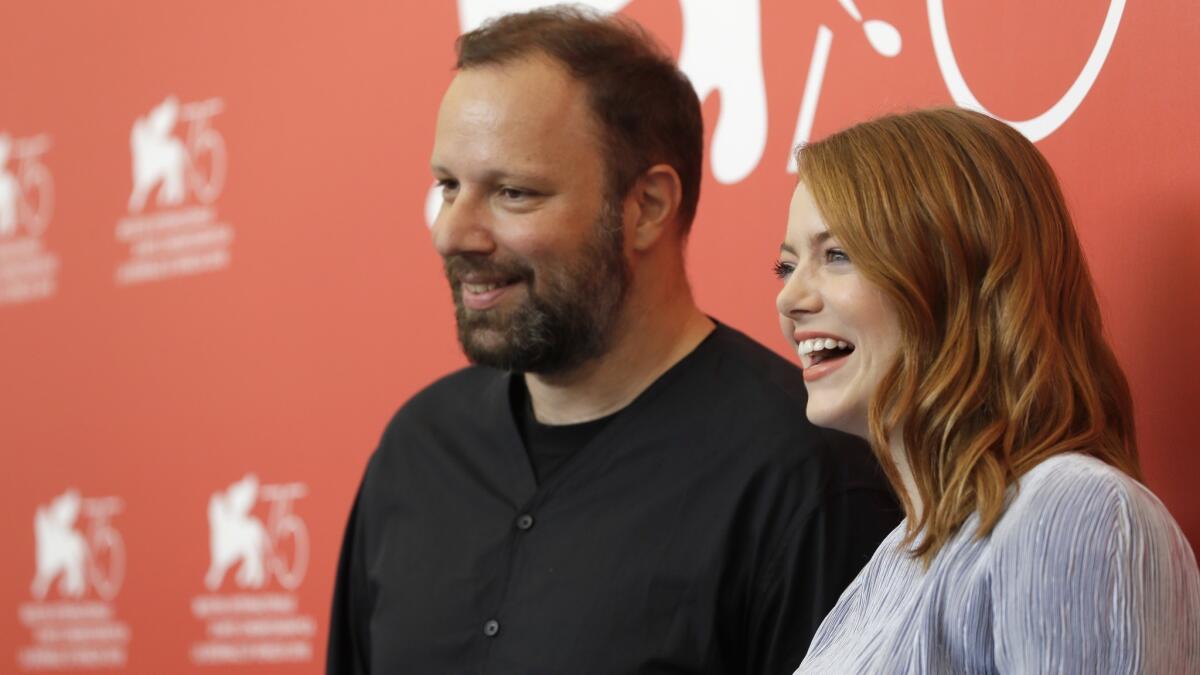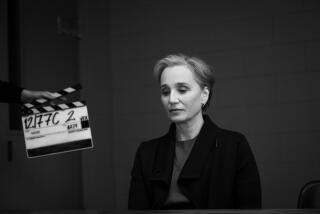Emma Stone and director Yorgos Lanthimos reinvent the costume drama with ‘The Favourite’
Reporting from Telluride, Colo. — Love them or hate them – and they tend to provoke strong reactions – the films of Greek director Yorgos Lanthimos have consistently demonstrated a flair for the perverse and a resistance to easy categorization.
Lanthimos’ 2009 breakout, “Dogtooth,” which earned a foreign language Oscar nomination, was a pitch-dark portrait of a family taking home schooling to a bizarre extreme. “The Lobster” from 2011 was a dystopian comedy in which single people are given 45 days to find a romantic partner to avoid being turned into animals. 2017’s psychological thriller “The Killing of a Sacred Deer” centered on a cardiac surgeon whose family falls prey to mysterious illnesses after being cursed by a disturbed teenage boy. (You know, those kinds of movies.)
While no less unapologetically strange and twisted, Lanthimos’ newest film, the gonzo period dramedy “The Favourite,” may be his most accessible to date – and, judging by enthusiastic early reactions at the Venice and Telluride film festivals, the Fox Searchlight release due to open Nov. 23 could be teed up for a strong awards-season run.
Set in the 18th century court of Queen Anne (Olivia Colman), the film centers on the increasingly vicious, sexually charged power struggle between two scheming cousins, played by Rachel Weisz and Emma Stone, as they vie for the emotionally volatile queen’s favor. Oscar prognosticators are already predicting that all three actresses will be in the mix as awards season rolls along.
The morning after the film’s first screenings at Telluride, The Times spoke with Lanthimos and Stone about upending the conventions of the period drama, the joy of wearing corsets and why you shouldn’t hold your breath for Lanthimos to make a superhero movie.

You generally go into a period costume drama expecting a certain kind of movie, and that usually doesn’t include things like a slow-motion duck race or scenes shot through a fisheye lens or filthy language. Was part of the appeal of this movie that you could take this sometimes stuffy genre and crack it open?
Lanthimos: Initially I was just interested in the story, but then in addition to that, the fact that it was a period film and I hadn’t made one, I thought it would be interesting to try and do something that gave a little bit of a twist to the genre and see what comes out. That was definitely part of it.
Stone: I just loved the script and I loved that it was such a unique version of a story set in 1705. [to Lanthimos] Is it 1705? I keep saying that.
Lanthimos: Somewhere around that. Don’t be specific.
Stone: But I like being specific.
Lanthimos: Yeah, but we’re not with the film. We’ve taken a lot of liberties with this story.
Stone: [in mock horror] We have? Oh no! I’ve told everybody this was historically factually accurate! This is going to be a movie they’ll show in history classes!
Emma, what were your expectations of working with Yorgos after seeing his earlier movies?
Stone: Well, I think I saw “Dogtooth” before I met him but I saw “The Lobster” after I met him, if I remember correctly. So I thought he was going to be a psychopath when I sat down with him. [laughs] I was like, “Oh God, this is going to be very scary.”
Then we sat down and he’s so normal and sweet that it was very confusing for me. I just wanted to see what it was going to be like. And it was a combination of both: sweet and scary. That’s you in a nutshell.
I was doing this talk earlier today and [the moderator] said, “It’s like a unicorn” and I said, “It’s like a unicorn in a corset.”
— Emma Stone on the trio of strong female characters in “The Favourite”
Yorgos, your movies are all incredibly different but they seem to share this theme of how power dynamics can get twisted in relationships. Is that just me trying to find a thread or do you see a through-line?
Lanthimos: I don’t really think of my work that way. I don’t step back and try to analyze it and try to think of the similarities and those kind of things. That’s for you to do. But obviously I’m the same person making them, so you can’t escape having certain ideas, obsessions, an approach to certain things — and at the same time, you’re trying different things and not repeating exactly the same thing.
I’m just trying to progress with every film I make and become better. Then you improve certain things and other things fall apart that worked well the previous time. It’s a constant effort to try to juggle all these different things.
Watching this movie about a royal court that’s filled with people scheming for power and influence over a leader who’s prone to unpredictable outbursts, I imagine some people are going to be reminded of the daily drama coming out of the White House. Was that in your heads at all when you were making it?
Stone: We met before any of that was even happening. This has been nine years in the making. So no one could have guessed what was to come.
Lanthimos: Yeah, we thought we were being extreme. [laughs]
Stone: We didn’t think this was a documentary!
To have a movie that’s built around three strong central female characters like this is obviously …
Lanthimos: Rare.
Stone: I mean, I don’t think of it so much as, “What a well-written female character.” I just think of it as, “What a well-written character that I might get to play and two other women will get that chance too.” But it is so rare to find parts like that for women. I was doing this talk earlier today and [the moderator] said, “It’s like a unicorn” and I said, “It’s like a unicorn in a corset.”
Lanthimos: Whatever your opinion of the character is — of Emma’s or the others — we tried not to make it so obvious and one-note and one-dimensional. We tried to make all three of them very complicated.
So how were those corsets?
Stone: [deadpan] They were great! They were very breathable. You could just put one on and go jogging. No, but you do get used to it after a while. And the costumes were just so beautiful. That [costume designer] Sandy [Powell], huh? She’s one of a kind. I loved the costumes, but it was an adjustment.
Emma, when I spoke to Julie Huntsinger, the director of Telluride, before the festival started, she told me that until this movie, she still thought of you as the girl next door. Does that factor into your thinking when you’re considering a role like this: “Nobody has seen me do this kind of thing before?”
Stone: No, not really. I mean, I have probably played a lot of roles that were younger than I now am, which I cannot get away with anymore. But no, I don’t think it’s as calculated as that.
But I’ll get nervous about things, for sure. Have you ever noticed that, Yorgos? Have you noticed that I tend to worry?
Lanthimos: No, no. You hide it so well.
I can see how this movie might have made you nervous. Among other things, you’re the only American in the cast and you’re doing a British accent. Did you have that accent in your back pocket already?
Stone: I had one that I had played around with. But I had a great dialect coach so that definitely helped. And because everyone on set also had that accent naturally, they were able to keep me in line.
These days, when directors make a splash with a smaller film, they sometimes get calls from studios to jump directly into big Hollywood tentpole movies. Have you gotten any of those calls, Yorgos?
Lanthimos: Not really. No studio picks up the phone after seeing “Dogtooth” and goes, like, “We have the next superhero movie.” Though if one did, that would be an interesting studio to work with.
Stone: I know there’s a superhero movie you’re dying to direct. [laughs]
Lanthimos: Gradually I have been getting some material after quite a few films and especially after I started making English-language films. But none of the blockbuster films or anything like that.
I don’t really know what it means now: “Hollywood films.” Is this a Hollywood film? I mean, I don’t know. I just do things that I’m interested in making and work with the people I’m interested in working with and it’s very important for me to maintain the creative control because otherwise I just don’t want to do it.
The whole process is so painful and difficult that I don’t want to be living through other people’s decisions and mistakes. I want all the mistakes to be mine, and I want to take responsibility for everything even if I fail. Whatever the project is, I need to have the final say.
This interview has been condensed and edited.
Twitter: @joshrottenberg
More to Read
Only good movies
Get the Indie Focus newsletter, Mark Olsen's weekly guide to the world of cinema.
You may occasionally receive promotional content from the Los Angeles Times.









